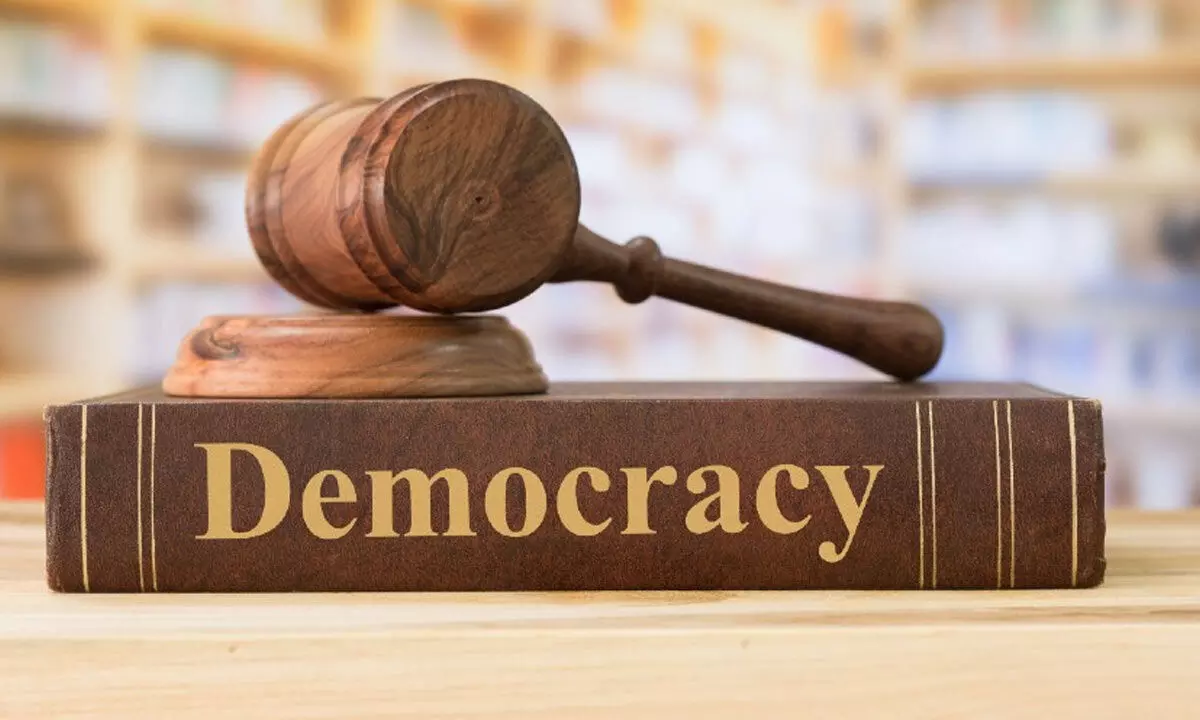Live
- MP BJP to celebrate former PM Vajpayee's birth anniversary on Dec 25
- Christmas Eve 2024: Heartwarming Messages To Share With Your Loved Ones
- PM Modi holds brainstorming session with economists in run-up to Budget
- “Telangana Ready to Support AI Technologies That Drive Social Impact,” says Special Chief Secy, Jayesh Ranjan at Woxsen University’s Future Tech Summit 2024
- Hero Motosports Team Rally Announces Squad For Dakar Rally 2025
- Two Men Found Dead In Parked Caravan In Kerala
- Mandhana moves closer to top spot in ODI, T20I rankings
- IND vs AUS Boxing Day Test 2024: Sam Konstas Debuts, Travis Head’s Fitness in Question
- Congress Challenges Election Rule Amendments In Supreme Court
- Jaishankar’s US Visit: Key Diplomatic Engagement Amid Leadership Transition
Just In
Unchecked, corporate funding cripples democracy


“We can have democracy in this country, or we can have great wealth concentrated in the hands of a few, but we cannot have both,” American Supreme Court judge Justice Louis Brandeis wrote once.
“We can have democracy in this country, or we can have great wealth concentrated in the hands of a few, but we cannot have both,” American Supreme Court judge Justice Louis Brandeis wrote once.
Ever since theSupreme Courtscrapped the electoral bond scheme on February 15 and asked the State Bank of India (SBI) to share all details on bonds sold and redeemed from April 2019, a lot of discussion has been taking place and the focus of it is more on who gave how much money to whom rather than how the whole issue impacts the common man.
Everyone agrees that the elections are becoming costlier and that democracy is getting undermined by money. This leads to political parties depending on donations from corporates and this is what impacts the life of the common man in a negative manner. But unfortunately, neither economists explain this nor will political parties speak about it.
This dependence on political funding by corporates has skewed elections in favour of the top 0.1% of the population. Every opposition party cries hoarse that the government of the day has failed and that the poor are becoming poorer and the rich are turning richer. What else do they expect to happen when all political parties depend on corporate funding? Once Prime Minister Narendra Modi (in a different context) said nothing comes free. True, even corporate funding does not come free. There has to be some returns and it is the common man who has to bear that burden. The governments hesitate to give tax relief to common man but are quick to help corporates get tax benefits in the name of development.
The relationship between corporate funding and elections cannot be denied by any party or leader. Only thing is that they do not have boldness to accept it. Reduction in corporate taxes is nothing but ‘returning the favour’ for funding political parties in the form of electoral bonds or for that matter in any other name. This certainly makes us move away from democracy whether one may agree or not. In fact, political parties have now changed the definition of democracy. If a leader is arrested, it is considered black day in democracy and threat to democracy. But if a common man is arrested even illegally, it is the law taking its own course. All political leaders feel they are above law and apostles of all good, nay, best virtues on the earth. They even want to run the government from jail.
What is the solution? The Union government should ban all forms of corporate donations, including electoral bonds. This should be followed by public funding of elections where each candidate who polls more than five per cent of the votes should get some fixed amount as reimbursement for the poll expenditure. This can be done if the tax benefits to rich corporates are stopped.
The most important solution is to control individual spending. Under the present system, the limit of Rs 75 lakh fixed by the Election Commission of India is always exceeded and yet the candidates and parties get away. There is a need for major electoral reforms and reinventing of the ECI to ensure that the limit fixed by ECI is strictly implemented.
European countries such as France and Belgium have curtailed private spending on elections through a series of legislations since the 1990s, thereby successfully negating the influence of the super rich in elections. In fact, France banned all forms of corporate funding in 1995 and capped individual donations at 6,000 Euros. ‘Where there is will there is a way.’ Will Modi 3.0 focus on this?

© 2024 Hyderabad Media House Limited/The Hans India. All rights reserved. Powered by hocalwire.com






